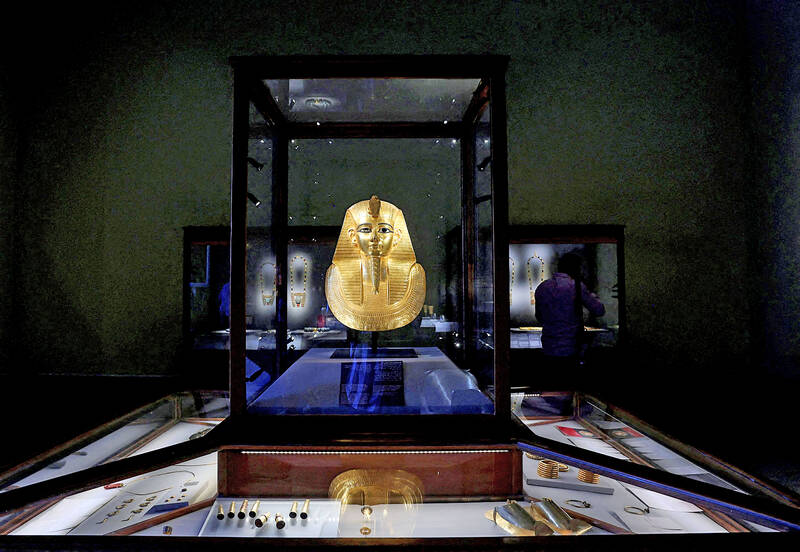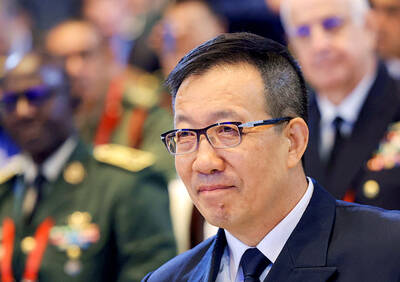Egyptian police on Thursday said they arrested a museum employee and three alleged accomplices after a priceless ancient gold bracelet was stolen from Cairo’s Egyptian Museum, sold for about US$4,000 and melted down.
The 3,000-year-old bracelet, a gold band adorned with lapis lazuli beads, dated back to the reign of Amenemope, a pharaoh of Egypt’s 21st Dynasty (1070 to 945 BC).
The priceless artifact had been kept under lock and key when it disappeared, a few weeks before it was meant to be exhibited in Italy.

Photo: Reuters
Museum staff reported it missing from a metal safe in the museum’s conservation lab on Saturday last week, Egypt’s Ministry of Interior said.
Investigations showed a restoration specialist working at the museum stole the bracelet on Tuesday last week while on duty.
A silver trader in central Cairo helped her facilitate the sale, first to a gold dealer for 180,000 Egyptian pounds (US$3,733), who then sold it to a worker at a gold foundry for 194,000 pounds, police said.
The bracelet was then melted down along with other scrap gold, the ministry said.
The suspects were taken into custody and confessed to the crime, authorities said.
Security camera footage released by Egyptian authorities showed a bracelet being exchanged for a wad of cash in a shop, before the buyer cuts it in two. However, the blurry images suggested the bracelet lacked the distinctive lapis lazuli bead seen in official photos shared a day earlier.
Egyptian news media earlier reported the loss was discovered during an inventory check ahead of the “Treasures of the Pharaohs” exhibition scheduled in Rome next month.
Under Egyptian law, stealing an antiquity with the intent to smuggle it is punishable by life imprisonment and a fine of 1 million to 5 million Egyptian pounds, while damaging or defacing antiquities carries up to seven years in prison and a maximum fine of 1 million pounds.
Egyptologist Jean Guillaume Olette-Pelletier said the bracelet was discovered in Tanis, in the eastern Nile delta, during archeological excavations in the tomb of King Psusennes I, where Amenemope had been reburied after the plundering of his original tomb.
“It’s not the most beautiful, but scientifically it’s one of the most interesting” objects, he said, adding that the bracelet had a fairly simple design, but was made of a gold alloy designed to resist deformation.
To the ancient Egyptians, the precious metal represented the “flesh of the gods,” while lapis lazuli — imported from what is now Afghanistan — evoked their hair, he said.
Egypt’s cultural institutions have been hit by similar high-profile thefts in the past.
Vincent van Gogh’s Poppy Flowers, worth US$55 million, was stolen from a Cairo museum in 1977, recovered a decade later, and stolen again in 2010. It remains missing.
Last month, an Egyptian man was sentenced to six months in jail in the US for smuggling nearly 600 looted artifacts onto the international market.
After Egypt’s 2011 revolution, looters took advantage of the chaos to raid museums and archeological sites, with thousands of stolen objects later surfacing in private collections worldwide.
The theft from the Egyptian Museum in Tahrir Square, one of the oldest in the country, comes just weeks before the anticipated Nov. 1 opening of Egypt’s new Grand Egyptian Museum, a major cultural project near the Giza Pyramids that has been years in the making.

DEADLOCK: Putin has vowed to continue fighting unless Ukraine cedes more land, while talks have been paused with no immediate results expected, the Kremlin said Russia on Friday said that peace talks with Kyiv were on “pause” as Ukrainian President Volodymyr Zelenskiy warned that Russian President Vladimir Putin still wanted to capture the whole of Ukraine. Meanwhile, US President Donald Trump said that he was running out of patience with Putin, and the NATO alliance said it would bolster its eastern front after Russian drones were shot down in Polish airspace this week. The latest blow to faltering diplomacy came as Russia’s army staged major military drills with its key ally Belarus. Despite Trump forcing the warring sides to hold direct talks and hosting Putin in Alaska, there

North Korea has executed people for watching or distributing foreign television shows, including popular South Korean dramas, as part of an intensifying crackdown on personal freedoms, a UN human rights report said on Friday. Surveillance has grown more pervasive since 2014 with the help of new technologies, while punishments have become harsher — including the introduction of the death penalty for offences such as sharing foreign TV dramas, the report said. The curbs make North Korea the most restrictive country in the world, said the 14-page UN report, which was based on interviews with more than 300 witnesses and victims who had

COMFORT WOMEN CLASH: Japan has strongly rejected South Korean court rulings ordering the government to provide reparations to Korean victims of sexual slavery The Japanese government yesterday defended its stance on wartime sexual slavery and described South Korean court rulings ordering Japanese compensation as violations of international law, after UN investigators criticized Tokyo for failing to ensure truth-finding and reparations for the victims. In its own response to UN human rights rapporteurs, South Korea called on Japan to “squarely face up to our painful history” and cited how Tokyo’s refusal to comply with court orders have denied the victims payment. The statements underscored how the two Asian US allies still hold key differences on the issue, even as they pause their on-and-off disputes over historical

BEIJING FORUM: ‘So-called freedom of navigation advocated by certain countries outside the region challenges the norms of international relations,’ the minister said Chinese Minister of National Defense Dong Jun (董軍) yesterday denounced “hegemonic logic and acts of bullying” during remarks at a Beijing forum that were full of thinly veiled references to the US. Organizers said that about 1,800 representatives from 100 countries, including political, military and academic leaders, were in Beijing for the Xiangshan Forum. The three-day event comes as China presents itself as a mediator of fraught global issues including the wars in Ukraine and Gaza. Addressing attendees at the opening ceremony, Dong warned of “new threats and challenges” now facing world peace. “While the themes of the times — peace and development —